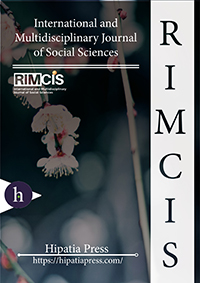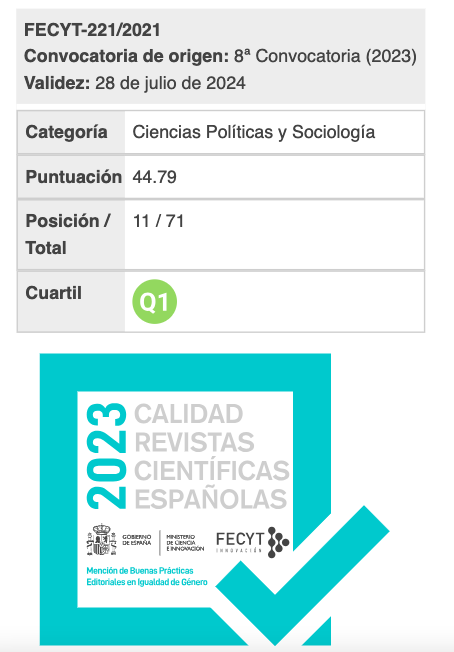Power and Cultures of the World. Developing New Social Architectures of Influence in the UN: A Network Analysis
Keywords:
Downloads
Abstract
The most important sociologists have discussed whether it is the social structure that produces individual behaviours or the latters are only the results of individuals’ will. In the literature of international relations, as well, a similar debate about the structure-agency problem has developed: in this context, the central question is whether or not there exist external sources of influences for the decisions that states take in international politics. This article, by sharing an integrative and post-structural approach (Archer, 1995; Foucault, 1970) proposes an empirical analysis of the formation of power architectures within the UN-SC surrounding the question of Intercultural Dialogue. A Social Network Analysis checks whether the way actors exercise power is concurrently the result of individual wills whose contents follows both institutional and cultural conditioning. Findings show that there is not a fixed structure of power relations which can be given for granted but it is continuously negotiated through both practices and social interactions. However, both institutional and, above all, cultural factors shape power relations.
Downloads
References
Archer, M.(1982). Morphogenesis versus structuration: on combining structure and action. British Journal of Sociology, 33(4), 455–483.
Google Scholar CrossrefArcher, M. (1988).Culture and agency: the place of culture in social theory. Cambridge University Press, Cambridge
Google Scholar CrossrefArcher, M.(1995).Realist social theory: the morphogenetic approach. Cambridge University Press: Cambridge.
Google Scholar CrossrefArcher, M.(ed.) (2013).Social Morphogenesis. Springer: New York.
Google Scholar CrossrefBello, V. (2017). Interculturalism as a New Framework to Reduce Prejudice in Times of Crises in European Countries.International Migration, 55 (2), 23-38. https://doi.org/10.1111/imig.12262
Google Scholar CrossrefBello, V. and Bloom, T. (2017). Interculturalism in Time of Crises: An Introduction. International Migration, 55 (2), 5-9. https://doi.org/10.1111/imig.12260
Google Scholar CrossrefBorgatti, S. Everett, M. & Johnson, J.(2013).Analyzing Social Networks. London: SAGE Publications.
Google Scholar CrossrefBourdieu, P. (1990a).In Other Words. Cambridge: Polity.
Google Scholar CrossrefBourdieu, P. (1990b).The Logic of Practice. Cambridge: Polity.
Google Scholar CrossrefDoherty, E. (2000). “Negotiating Across Disciplines: The implications of judgment and decision-making research for international relations theory.” In E. Doherty& R. Sil (Eds.). Beyond boundaries? disciplines, paradigms, and theoretical integration in international studies (pp. 31-57). Albany: SUNY Press.
Google Scholar CrossrefFoucault, M. (1970).The Order of Things. New York: Routledge.
Google Scholar CrossrefDunne, T., Kurki, M. & Smith, S. (Eds.) (2007). International Relations Theories: Discipline and Diversity, Oxford University Press, Oxford.
Google Scholar CrossrefElder-Vass, D. (2010).The Causal Power of Social Structures: Emergence, Structure and Agency. Cambridge University Press: Cambridge.
Google Scholar CrossrefElias, J. & Sutch, P. (2007). International relations: the basics. London: Routledge.
Google Scholar CrossrefFernandez, R. & Gould, R. (1994). A Dilemma of State Power: Brokerage and Influence in the National Health Policy Domain. American Journal of Sociology. 99, 1455-91.
Google Scholar CrossrefFinnemore, M. (2008). Legitimacy, Hypocrisy, and the Social Structure of Unipolarity. World Politics, 61(1), 58-85. https://doi.org/10.1017/S0043887109000082
Google Scholar CrossrefFoucault, M. (1970).The Order of Things, New York: Routledge.
Google Scholar CrossrefFoucault, M. (1979).Discipline and Punish:The Birth of the Prison. Penguin Books: London.
Google Scholar CrossrefGiddens, A. (1979).Central problems in Social Theory: Action, Structure and Contradiction in Social Analysis. London : Macmillan.
Google Scholar CrossrefGiddens, A. (1990).The Consequences of Modernity. Cambridge: Polity.
Google Scholar CrossrefGiddens, A. (1991).Modernity and Self-Identity. Self and Society in the Late Modern Age. Cambridge: Polity.
Google Scholar CrossrefGoldstein, J.& Pevehouse, J.(2006).International Relations, 7th Ed. Pearson Longman, London.
Google Scholar CrossrefGordon, C. (Ed.) (1980).POWER/KNOWLEDGE. Selected Interviews and Other Writings1972-1977byMichel Foucault. Pantheon Books: New York.
Google Scholar CrossrefHanneman, R. & Riddle, M. (2005).Introduction to Social Network Analysis. Riverside, CA: University of California.
Google Scholar CrossrefKay, S. (2011). Global Security in the Twenty-First Century: The Quest for Power and the Search for Peace. Lanham, MD: Rowman& Littlefield.
Google Scholar CrossrefKeohane, R. & Nye, J. (2001). Power and Interdependence. New York: Longman.
Google Scholar CrossrefLebow, R.(2007). Classical Realism. In T. Dunne, M.Kurki& S. Smith (Eds). International Relations Theories: Discipline and Diversity.Oxford: Oxford University Press.
Google Scholar CrossrefMaoz, Z. (2011). Networks of Nations. The evolution, structure, and impact of international networks, 1816-2001. New York: Cambridge University Press.
Google Scholar CrossrefMearsheimer, J.(2007). Structural Realism. In T. Dunne, M.Kurki& S. Smith (Eds). International Relations Theories: Discipline and Diversity. Oxford: Oxford University Press.
Google Scholar CrossrefMeer, N. & Modood, T. (2012). How does Interculturalism Contrast with Multiculturalism? Journal of Intercultural Studies, 33(2), 175-196. https://doi.org/10.1080/07256868.2011.618266
Google Scholar CrossrefSwartz, D. (2013).Symbolic Power, Politics, and Intellectuals: The Political Sociology of Pierre Bourdieu. The University of Chicago Press: Chicago.
Google Scholar CrossrefSze, F. & Powell, D. (2004).Interculturalism: Exploring Critical Issues. Oxford, UK: Inter-disciplinary Press.
Google Scholar CrossrefVertovec, S. &Wessendorf, S. (2010). Introduction: Assessing the backlash against multiculturalism in Europe. In: S. Vertovec & S. Wessendorf (Eds.). The Multiculturalism Backlash. London: Routledge.
Google Scholar CrossrefWallerstein, I. (1990). Culture as the Ideological Battleground of the Modern World-System. Theory, Culture and Society, 7(2): 31-55. https://doi.org/10.1177/026327690007002003
Google Scholar CrossrefWaltz, K. (1990). Realist thought and neorealist theory. Journal of International Affairs, 44 (1): 21-38.
Google Scholar CrossrefWasserman, S. & K. Faust (1994).Social Network Analysis. Methods and Applications. Cambridge: Cambridge University Press.
Google Scholar CrossrefWeber, C. (2009). International Relations Theory: A Critical Introduction, 3rd Ed. London: Routledge.
Google Scholar CrossrefWeedon, C. (1987). Feminist Practice and Poststructuralist Theory. Blackwell: London.
Google Scholar CrossrefWendt, A. (1992). Anarchy is what states make of it: the social construction of power politics. International Organization, 46 (2), 391-425. DOI: 10.1017/S0020818300027764
Google Scholar CrossrefWendt, A. (1994). Collective Identity Formation and the International State. American Political Science Review, 88(2), 384-396. DOI: 10.2307/2539217
Google Scholar CrossrefWendt, A. (1995). Constructing International Politics. International Security, 20(1), 71-81. DOI: 10.2307/2539217
Google Scholar CrossrefWendt, A. (1999). Social Theory of International Politics. Cambridge, UK: Cambridge University Press.
Google Scholar CrossrefDownloads
Published
Almetric
Dimensions
How to Cite
Issue
Section
License
Copyright (c) 2020 International and Multidisciplinary Journal of Social Sciences

This work is licensed under a Creative Commons Attribution 4.0 International License.
All articles are published under Creative Commons copyright (CC BY). Authors hold the copyright and retain publishing rights without restrictions, but authors allow anyone to download, reuse, reprint, modify, distribute, and/or copy articles as the original source is cited.















